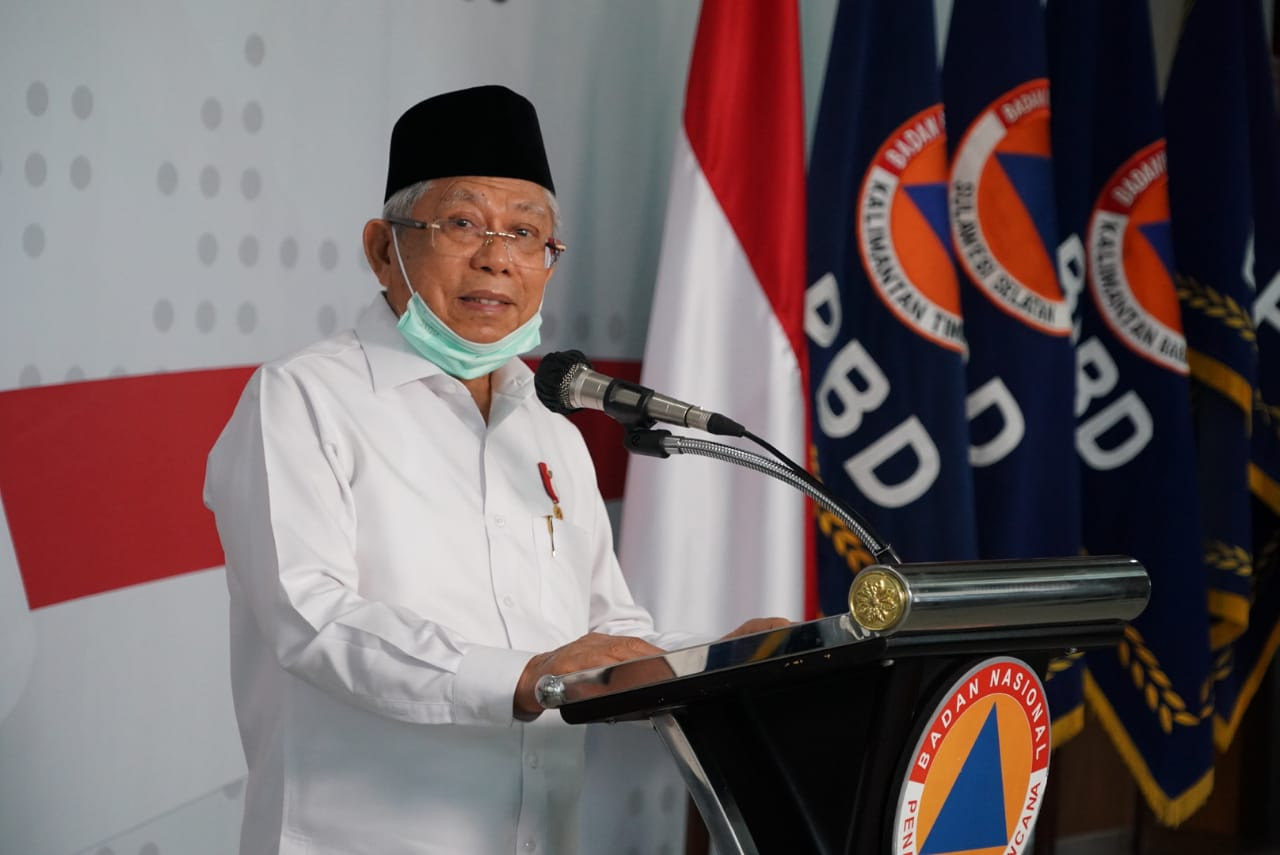Popular Reads
Top Results
Can't find what you're looking for?
View all search resultsPopular Reads
Top Results
Can't find what you're looking for?
View all search resultsMa'ruf 'could do more' to develop sharia economy
As the former chairman of the Indonesian Ulema Council (MUI) and the supreme leader of Nahdlatul Ulama, Ma’ruf was well placed to play a major role in promoting the sharia economy in Indonesia.
Change text size
Gift Premium Articles
to Anyone
A
s a respected elder figure among the Muslim grassroots, Vice President Ma’ruf Amin was initially expected to play a significant role in enacting policies that could benefit Indonesia’s majority-Muslim population.
But analysts have suggested that Ma’ruf could still do more to promote the sharia economy and finance.
As the former chairman of the Indonesian Ulema Council (MUI) and the supreme leader of Nahdlatul Ulama, Ma’ruf was well placed to play a major role in promoting the sharia economy in Indonesia.
But more concrete actions were expected of him after being sworn in as the nation’s second-in-command, said Kunto Adi Wibobo, executive director of Jakarta-based pollster KedaiKOPI.
“His position as the vice president would be vital in developing the sharia economy and finance, but it didn’t automatically pave the way for him [to become a lot more involved] in the decision-making process,” he told The Jakarta Post on Tuesday.
The role of Islamic social finance in Indonesia cannot be underestimated, with Islamic charity and social movement networks reaching deeper and further into the grassroots than most state-led social safety net initiatives.
The government launched a masterplan for the sharia economy last year, which provides a five-year development roadmap with a focus on industries such as the food and beverage sector, among other things.
The plan hopes to transform Indonesia into a net producer of halal goods and services, instead of merely being a big market for them.
The National Committee for Sharia Economy and Finance (KNEKS) was set up for this purpose, with President Joko “Jokowi” Widodo at its helm and the Vice President as its executive chairman.
However, SEBI School of Islamic Economy researcher Azis Budi Setiawan says that the masterplan has yet to translate into any significant breakthrough in the world of Islamic finances.
“The government needs to go the extra mile,” Azis told the Post.
“The President and [the KNEKS] executive chairman should speed up [the enactment of] policies that highlight progress on the road to becoming one of the centers of Islamic finance and the halal industry supply chain,” he said.
Kunto of KedaiKOPI said that Ma’ruf’s preference for adopting a more backseat approach to his role as vice president stood in stark contrast to his predecessor Jusuf Kalla, who would probably have taken a more active role in times of crises like the current COVID-19 pandemic.
He did however expect the Islamic finance expert and former lawmaker to play a more prominent role in the nation’s recovery, with the sharia economy possibly playing a key role in supporting the country’s economy.
“In the midst of the pandemic, breakthroughs in the sharia economy and finance could help the country as it flirts with recession,” Kunto said.
“Ma’ruf should encourage the state to focus more on developing the sharia economy, particularly in providing stimulus programs among sharia-based businesses and strengthening sharia institutions to maximize the market’s potential.”
Even before he was sworn in as vice president, most political observers had written off Ma’ruf as a token figure to bolster Jokowi’s credentials as a Muslim candidate on the campaign trail.
The strategy paid off and Jokowi was reelected by a margin wider than he secured in the 2014 election.
Unlike Kalla, Ma’ruf has largely kept out of the limelight since taking public office, save for a few overseas trips to friendly countries and attendance at Cabinet meetings and self-contained Islamic forums.
This has caused people to question his whereabouts and the extent of his activities, culminating in the hashtag #MarufAminNgapain (What’s Ma’ruf Amin up to?) that appeared on Twitter on March 11, coinciding with his 77th birthday.
His supporters came to his defense, with some officials saying he had been carrying out his role as vice president to the best of his abilities.
But given his background and expertise, Ma’ruf’s work could only be judged from the progress he makes on advancing the sharia economy and finance in Indonesia, said Ujang Komarudin, the executive director of Indonesia Political Review.
“If we want to objectively judge [his performance], then we have no other option than to judge him on that aspect,” said Ujang.
Which is not to say that the elderly mullah has been idling.
On Monday, the Vice President joined a video conference of the Indonesian Waqf Board (BWI) to launch the national waqf movement, which aims to widely promote waqf, or religious endowments, among Indonesians.
He laid out a plan of action for the movement that includes mainstreaming the idea of Islamic endowments, increasing the number of waqf assets, practitioners and beneficiaries, as well as bolstering synergies between managers of waqf, zakat and other Islamic social funds.
Also on Monday, Ma’ruf also participated in a virtual ceremony for the Global Islamic Finance Award (GIFA) live-streamed from Pakistan – Indonesia’s KNEKS won the event’s Advocacy award.
“This award recognizes the key role of KNEKS in helping to speed up, expand and advance the development of the sharia economy and finance in Indonesia,” Ma’ruf said in a press statement.
“In Indonesia, the development [of sharia finances] has a different character to that of other countries, as it is considered one of the pillars of the national economy’s resilience, in sync with the conventional economy.”










